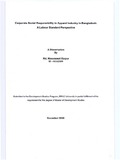Corporate social responsibility in apparel industry in Bangladesh : a labour standard perspective

View/Open
Date
2008-12Publisher
BRAC UniversityAuthor
Haque, Md. MozammelMetadata
Show full item recordAbstract
Corporate Social Responsibility (CSR) in the business firms and enterprises has evolved as an indispensable part for greater business and economic successes. In the context of free market economy, corporations are increasingly operating business across boundaries where sensitivity to social and environmental issues and accountability to society at large are considered pivotal for corporate performances. This paper seeks to explore the corporate perception, practices and current trends of CSR in the export-oriented apparel industry in Bangladesh.
This is an exploratory research and was carried out using both quantitative and qualitative techniques. The study selected 5 firms objectively drawn from different parts of industrial zones-Dhaka, Gazipur, Savar, DEPZ and interviewed owners, managers, and workers, mainly the female workers.
The study finds business firms have felt pressure from the external buyers, trade associations and also from the competitors that drives their decision to adopt CSR practices at initial stage but gradually they are driven by the values to remain competitive in the market. Value shifting occurs due to both mimetic and normative pressure that pushed them to introduce legitimate behavior to their stakeholders. Employee welfare found as the prime concern of the selected firms and health, safety and security measures are considered for continuous improvement. Such pressure results from not only the need to provide credibility to foreign buyers but also the need for strong accountability to the workers.
Initially the buyers' orders were an incentive for the firms but overtime it has changed towards increase in productivity. However, increasing productivity still are assumptions of the firms, which is not supported by the facts and information. Nevertheless, the association test results indicate that the sign of the relationship is positive and statistically significant, supporting the view that socially responsible corporate performance can be associated with a series of bottom-line benefits.
